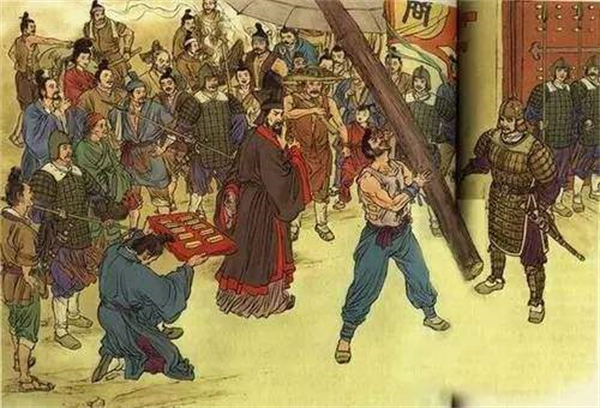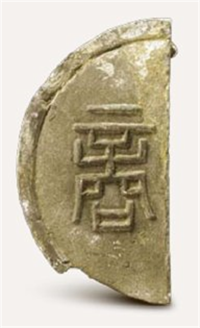Shang Yang’s Political Reforms During the Qin Dynasty
In 770BC, King Pingwang of the Zhou Dynasty moved the then capital eastward to Luoyang. Thanks to his efforts in escorting the king eastward at that time, Duke Xianggong, the head of Qin People, was bestowed a vassal title. Henceforward, just as the curtain of the Spring and Autumn Period and Warring State Period, an age of social upheavals and disorders, was drawn open, Qin People established the state and became one major power in the political arena at that time. Through the unremitting efforts of four rulers over 80 years, the state of Qin turned into one large state extending eastward from the recent Tianshui area in Gansu Province, to Huaxian County in Shaanxi Province. During merely one century since the reign of Duke Mugong of Qin, the State of Qin rose to one of the five powers together with such traditional powers as the states of Qi, Chu, Jin etc. In the Warring States Period, Qin took advantage of its unique location and fulfilled one after another military glories in its combating with the other powers. With its exponential growth, Qin expanded its territory eastward and gradually annexed the states of Han, Zhao, Wei, Chu, Qi etc. Eventually, Qin established the first unified and centralized empire in the Chinese history.
From a puny clan, the Qin People gradually grew to one of the 7 major powers in the Warring States Period, which laid the basis for its later becoming a super unified empire. Through 500 years of painstaking efforts, Qin put an end to the old age and initiated a new period in Chinese history. Its success was unprecedented and was never surpassed by the following dynasties. Qin People established the State of Qin in Shaanxi which explains why the province is also known as qin. Qin People, Qin State, the Qin Dynasty and the unprecedented victory of Qin make qin an alias of the Chinese people in the world.

At the end of the Warring States period, Ying Zheng, King of the Qin State, defeated other states and turned China into a unified empire. His victory could not have been scored without the painstaking efforts of his predecessors. 100 years before his reign, his ancestor, Duke Xiaogong of the Qin State, appointed Shang Yang to conduct political reforms, which laid a solid foundation for his success in unifying the entire nation.
When Duke Xiaogong acceded to the throne, a political pattern with seven powers including Qi, Chu, Yan, Han, Zhao, Wei and Qin coexisting was formed. Although Qin had become a power in the western part of China under Duke Mugong’s successful leadership which laid the basis for the development of the Qin State, rulers after him were mostly impotent and the state was on the verge of being annexed by other states when Duke Xiaogong came to the reign. Faced with such a critical situation, Duke Xiaogong appointed the well-known reformer Shang Yang to conduct social reforms.
With the support of Duke Xiaogong, Shang Yang conducted two rounds of reforms in 356BC and 350BC, which mainly included such reforms as:
1. To improve the legal system through fortifying rules and regulations and making the legal system applicable and universal.
2. To realize the final aim of strengthening the state, some policies were implemented. To stimulate farming and weaving, for instance, rules were made to exempt those who were engaged in farming and weaving from penal servitude and thralldom. For those who pursued petty personal interests, speculated and who were slack on farming, their wives and daughters would be forced to become servants or housemaids for the governmental officials as a punishment.
Additionally, some official orders were promulgated to encourage small-scale farming and increase taxation. In terms of military award, rules were made to grant titles to those meritorious soldiers according to their contribution. In addition, 21 ranks were regulated to award those who beheaded enemies. Meanwhile, turncoats and traitors were liable to severe punishment.
3. To deprive those old nobles of their privileges through legal measures. The hereditary systems for noble ranks and salary, for instance, were abolished to give way to new practice of awarding titles for military exploits. The rule had that noble families apart from the direct descents of the king would be deprived of their ranks and salaries if they failed to score any military exploit. The system of enfeoffment was also replaced by the system of prefectures and counties, which put an end to the old nobles’ monopoly over a certain district and therefore enhanced the central government’s complete control over the local governments.

Tile-end with the character of “shang” unearthed in the manor estate of Shang Yang
4. To fully implement the concepts of “ruling the country by law” and “clarifying rules and enforcing legal punishment” put forward by the legists. Firstly, the concept of “ruling the country by law” was emphasized, which required all the subjects, with officials in particular, to learn and acquire laws and rules. Secondly, severe punishment was adopted for even minor lawbreaking. Severe punishment was advocated by Shang Yang in his reform, which emphasized adoption of severe punishments to deter even minor criminals. Thirdly, to establish the severe legal system and emphasize the seriousness of laws and rules, no exemption or forgiveness was allowed in crimes of any kind. Fourthly, evil and crime reporting was strongly encouraged. To effectively correct and stop social evils and keep social order, many regulations were promulgated to encourage people to report evil and illicit behaviors. Reporters were equally awarded as those who beheaded enemies in the battlefield. Fifthly, joint responsibility system was adopted. Neighbors in the distance of five or ten blocks, for instance, were responsible for reporting evil or illicit deeds of any neighbor. And all the neighbors are liable to punishment and even imprisonment if one of the neighbors committed any crime. Besides, joint responsibility system was also applicable to households, military squads or related official positions.
Because of Shang Yang’s reforms, the State of Qin entered a brand new stage. The previous land ownership featuring suzerain land ownership was replaced by the private ownership of the land by the landlords. The system of enfeoffment had basically given way to the system of prefectures and counties. These reforms changed the underdeveloped Qin to a powerful empire with strong military forces feared by all other vassal states. Twenty years of reforms deeply influenced people of various backgrounds and no wonder historic records have that “all ordinary people including women and children were heard talking about Shang Yang’s Reforms”. Such pervasive legal awareness was rarely seen in other periods of the Chinese history.
The thorough and complete reforms were extremely successful and the State of Qin experienced rapid economic growth with people living in abundance. The new rules for awarding military merits stimulated the morale of soldiers, which strongly enhanced the battle effectiveness of the Qin army. Severe legal systems make “people satisfied” and “society orderly with nobody daring to take anything other than they deserved”. All these successful measures helped the State of Qin become the most powerful state among the seven powers, which contributed greatly to its unification cause. Shang Yang’s Reforms are indefinitely one influential historic event in the Chinese history.
Noticeably, various reforms had already been taken before Shang Yang’s Reforms. Duke Mugong of Qin, for example, benefited from his political and economic reforms and became one of the five influential rulers of the Spring and Autumn Period. In the successive dynasties, a great number of social or economic reforms were also adopted in Shaanxi, which proved to be effective and influential in various stages of the Chinese history. Reforms of Emperor Wendi and Emperor Jingdi in the Western Han Dynasty, Wang Meng’s Reforms in Former Qin Period, Emperor Wudi’s Reform in the Northern Zhou Dynasty, Reforms by Emperor Wendi of the Sui Dynasty, the well-known reforms of the Zhenguan Period and Kaiyuan Period in the Tang Dynasty were all significant reforms which led to abundance in people’s life and promoted the social development. Successful reforms can be found in any places of the world, but what makes Shaanxi special is that it was once the venue for so many successful reforms conducted over such a great number of historic periods. Shaanxi was an ideal location for reforms in Chinese history and its previous glories enriched our understanding about its importance in Chinese civilization.


